Chapter 8 - Genre
Published online by Cambridge University Press: 26 October 2023
Summary
THIS IS A GENRE FILM/SERIES AND YOU KNOW IT STATEMENTS OF INTENT PART II
The association between meta and genre seems fairly obvious in 2022. The adjective “meta,” as we have seen in Chapter 1, is often used in reference to popular genre films and series, whether horror (the Scream franchise, Goodbye, Dragon Inn, The Cabin in the Woods, Scream Queens), science fiction and fantasy (Doctor Who, Supernatural, Deadpool), or comedy (Community, The Good Place [NBC, 2016–20]). Genres that are not predominantly comedy usually contain a healthy dose of humor and rely on parody, a practice that is regularly associated with metafiction. Like adaptations and remakes, genre films and series, and more generally works that engage with specific genres, often assume their secondariness. (Metz even goes so far as to suggest that “[i]n an extreme sense, all genre films […] contain within themselves all the previous films of the same genre, so they share a very broad lineage of ‘films within a film,’ which do not present themselves as such but whose traces may be found everywhere.”) The recognition of this secondariness can include specific hypotexts, as in the case of adaptations and remakes, but it implies, more broadly, an “architext.” Gérard Genette understood “architextuality” as “the entire set of general or transcendent categories—types of discourses, modes of enunciation, literary genres—from which emerges each singular text.” Genre is but one form of architext (in film, classical narration would be another), and in the case of mainstream productions, it may perhaps be the most central (again, alongside narrative conventions). It is thus the elaboration of an overt or covert discourse on the relationship between the film or series and its raw material—a hypotext in the case of an adaptation or a remake, an architext in the case of a genre film, oftentimes both, as we have seen in the case of The Portrait of a Lady and The Texas Chainsaw Massacre—that qualifies as meta.
Both Hutcheon and Waugh have shown how literary metafiction foregrounds the codes of a given genre such as the novel.
- Type
- Chapter
- Information
- Meta in Film and Television Series , pp. 180 - 204Publisher: Edinburgh University PressPrint publication year: 2022



